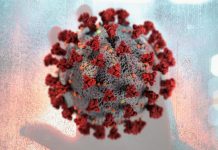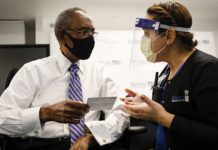Parents will now be able to get their children vaccinated at pharmacies in all 50 states starting this fall, thanks to a new federal directive designed to fight falling vaccination rates reported during the pandemic.
- A new federal emergency authorization will permit pharmacists in all 50 states to administer routine childhood vaccines.
- The authorization is part of an effort to offset falling childhood vaccinations rates reported during the pandemic.
- Health experts say it’s still crucial for kids to still be routinely evaluated by their physicians.
The authorization, which went into effect Monday, August 24, comes from the U.S. Department of Health and Human Services (HHS) and allows certain pharmacists at select locations to administer routine vaccinesTrusted Source recommended by the Advisory Committee on Immunization Practices.
Previously, only 28 states permitted pharmacists to administer vaccines to children.
Under the emergency authorization, pharmacists across the country will be able to order and administer the vaccines without a prescription from a doctor, the HHS confirmed.
According to the Centers for Disease Control and Prevention (CDC)Trusted Source, childhood vaccines typically administered in doctors’ offices have plummeted during the pandemic.
The CDC attributes the falling vaccination rates to families’ recent changes in healthcare access along with the shelter-in-place and social distancing recommendations put in place to blunt the spread of COVID-19.
Parents have also been concerned that a child’s checkup could potentially expose the family to the coronavirus, according to the CDC.
Now, as the school year kicks off, health officials want to ensure kids are properly immunized even if they aren’t heading back to the classroom in person.
“COVID-19 disrupted lifesaving vaccination at a global level, putting millions of children at risk of falling behind on recommended vaccines. While there are indications that well-child checks and vaccinations are returning to their pre-pandemic levels, because of the extraordinary commitment of these children’s healthcare providers, it is critical to catch up all children on their routine vaccines as soon as possible,” an HHS spokesperson told Healthline.
Vaccines that are available at your local pharmacy
Multiple vaccines will be available at pharmacies to help prevent outbreaks of preventable diseases such as measles, varicella, tetanus, and polio.
Children ages 3 to 18 will be able to receive any of the routinely recommended childhood vaccinationsTrusted Source at select pharmacies.
Some vaccines available include the measles-mumps-rubella (MMR) vaccine, hepatitis A and B, tetanus, human papillomavirus (HPV), meningococcal, poliovirus, and varicella (chickenpox).
Licensed pharmacists will need to undergo an extension training program prior to administering any vaccines.
Pharmacists will not be permitted to vaccinate children under 3 years of age, as doing so requires advanced medical training.
Parents should bring a copy of their child’s medical history and past immunizations to the pharmacy.
Childhood vaccines are important, especially during COVID-19 outbreak
Being able to have children vaccinated at pharmacies expands healthcare access to families, particularly those who live in underserved areas.
Though many Americans live far from a healthcare provider, 90 percentTrusted Source of Americans live within 5 miles of a pharmacy.
“This adds to the list of immunizers opening opportunities for children to receive their vaccines. Pharmacists are already experienced in immunizations as they have been administering them for years now,” says Dr. Marietta Vázquez, a Yale Medicine pediatrician.
The HHS told Healthline it’s crucial to vaccinate children on time, especially during the pandemic.
The vaccines available can help prevent 16 potentially life threatening diseases in children.
“Diseases such as whooping cough or pneumococcal disease can leave a child vulnerable during the pandemic, when healthcare resources may be strained,” the HHS spokesperson said.
Any kids who have fallen behind on their vaccinations should see a healthcare provider immediately to catch up on their vaccines.
“There is a large group of patients behind in their recommended vaccines, plus of course all of those who are not delayed but still need to visit their doctor to get their next set of vaccines, plus the many patients needing routine physicals,” says Vázquez.
Declining immunization rates among children is a serious public health threat.
“Preventable infectious diseases could potentially surge as herd immunity wanes,” says Dr. Michael Grosso, the chief medical officer and chair of pediatrics at Northwell Health’s Huntington Hospital.
According to Vázquez, the change will provide some much-needed relief to pediatric offices that will likely have an increased demand from patients who’ve put off doctor visits during the pandemic.
“The demand exceeds available appointments. We must be creating vaccination opportunities to meet this crucial need,” says Vázquez.
SOURCE: Healthline







